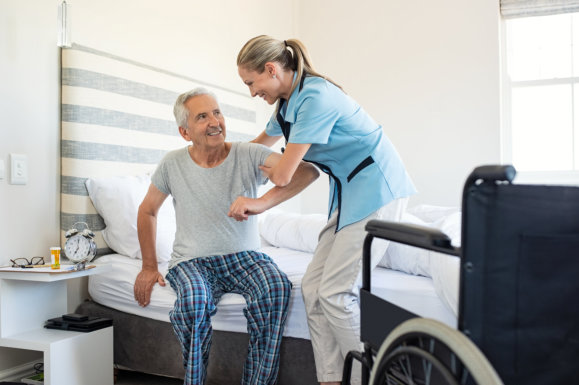Understanding the Basics of Pain Management in Seniors

There are several factors that one should take into account when it comes to managing senior individuals’ pain. As a consequence, it can be a complex undertaking for geriatric healthcare professionals. But what needs to be determined, first and foremost, is whether your aging family members are suffering from acute pain or chronic pain because the type and quality of nursing care in New Jersey that they ought to receive will depend on the type of pain that your loved ones are feeling.
To differentiate between the two, acute pain is oftentimes sporadic and results from incidents such as surgical procedures and sudden injuries. In case your loved ones are suffering from acute pain brought about by surgery, you need to make plans on how to manage their pain before they go under the knife. You cannot consistently control acute pain, so you may want to bring up the idea of having your older family members receive exceptional home care services in Bloomfield, New Jersey. Having professional home caregivers around to assist your loved ones can truly help since excellent caregivers can ensure that your elderly patients are continually receiving the regular and correct pain management doses they need. They can also monitor any complications that may arise.
On the other hand, chronic pain worsens as time flies by and can last for several years. Because of its predictable nature, pain management for family members receiving senior care in New Jersey is much easier to administer. Usually, their treatment requires the supervision of medically trained personnel due to the risk of side effects from their medications or their fragile health situations.
Importance of Pain Management to Seniors
- It is preventative. Chronic low pain seniors are at higher risk for chronic conditions such as heart disease, diabetes, osteoporosis and arthritis. Treating the pain of these conditions can prevent further complications.
- It reduces anxiety and depression in senior citizens who may have been going through a hard time in their life.
- It is necessary to get a proper diagnosis of pain due to the fact that pain can be a symptom of an underlying serious condition such as diabetes, cancer, depression, etc.
- It reduces the need for drugs in seniors by preventing chronic opioid addiction and drug side effects such as nausea, constipation and drug tolerance. Over time, these side effects can lead to other health problems such as problems with high blood pressure or heart disease.
- It reduces the strain on caregivers due to the fact that seniors in persistent chronic pain often rely on others for basic tasks and can be more abusive, depressed, anxious and fearful. These psychological factors can also lead to other health issues.
- It enhances the quality of life of the senior citizen by reducing their dependence on others for every task, improving their mood and overall quality of life. It is also easier to recover from surgery or a disease if a person has been free from pain for an extended period prior to surgery or diagnosis.
How Can You Help Your Seniors Manage Their Pain?
- Encourage them to talk to their doctor about whether it is possible for them to reduce or discontinue the use of certain medications or substances a doctor may be prescribing.
- Be aware of any new symptoms and seek medical attention when necessary.
- Encourage your seniors to exercise, but don’t force them if they are too uncomfortable or unwilling. A more senior-friendly workout would be walking or swimming as opposed to jogging or aerobics.
- Talk with your seniors about what activities they want to pursue that they might have given up because of pain, and encourage them not to give up!
- Encourage your senior to eat foods that are naturally anti-inflammatory, like fruits and vegetables, whole grains, and beans. Adopting a more anti-inflammatory diet can help reduce the pain they may be experiencing.
- Encourage your seniors to get a better night’s sleep! Lacking an adequate amount of sleep can increase pain experience in seniors because it puts them in a constant state of stress and often leads to depression, which is also chronic pain’s other big co-morbid condition.
- If you live in the senior’s house, make sure they have enough pillows and blankets for their comfort.
- Monitor your seniors for basic signs of chronic pain, including loss of appetite, constipation, and weight gain.
- Keep your seniors hydrated. Seniors often think that water is harmful to them, but it’s important for all aspects of health.
- Help your seniors maintain a healthy body temperature and increase their body temperature when they are in the heat to help with pain management (more on this later).
- Make sure your seniors have a safe place to sit or lie down when they need to, and make sure they have a comfortable place to sleep.
If you are looking for a home care arrangement that can accommodate your loved ones’ needs, don’t hesitate to explore your options with us. Call Serenity Senior Care for additional information and assistance.


